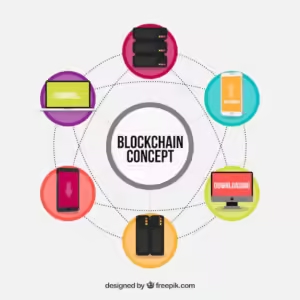Introduction to Blockchain Technology


Blockchain technology has become a buzzword over the last decade, but many people are still unsure of what it actually is and what makes it so revolutionary.Blockchain, in basic terms, is a digital ledger that is decentralized and records transactions across numerous computers. This ensures that the data recorded is secure, transparent, and tamper-proof.
Invented in 2008 by an unknown person (or group) under the pseudonym Satoshi Nakamoto, blockchain was initially created to support Bitcoin, the first cryptocurrency. Since then, it has evolved to become a powerful technology used in various industries beyond digital currencies.
Decentralization: Power to the People
One of the key advantages of blockchain is decentralization. In traditional systems, intermediaries like banks or brokers are needed to verify and process transactions. Blockchain, however, operates on a peer-to-peer network where all participants have equal authority. This removes the need for middlemen, reduces costs, and speeds up transactions.
For example, decentralized applications (dApps) like Uniswap (a decentralized exchange) and MakerDAO (a decentralized lending platform) are disrupting the finance industry by allowing people to trade, lend, and borrow without a central authority.
Security and Transparency: The Core Strengths
Security is another major strength of blockchain technology. Data on a blockchain is encrypted using cryptographic techniques, making it nearly impossible for unauthorized users to alter or access the information.
In addition, blockchain provides transparency through its distributed ledger system. Every transaction that takes place on a blockchain is recorded in a public ledger, which is accessible to anyone on the network. This ensures accountability and trust, as all transactions are verifiable by anyone at any time.
Immutability: Data You Can Trust
Immutability refers to the fact that once data has been added to a blockchain, it cannot be changed. This makes blockchain ideal for recording important data, such as financial transactions, medical records, or legal contracts.
For instance, in industries like finance or supply chain management, immutability ensures that transaction histories are accurate and cannot be tampered with. This adds an extra layer of trust and reliability, which is vital in today’s data-driven world.
Cost Efficiency: Saving Resources
Blockchain can significantly reduce operational costs for businesses by eliminating intermediaries and automating processes. For instance, in the financial sector, traditional banking transactions involve various third parties that charge fees. Blockchain-based transactions cut out these middlemen, leading to cost savings.
A great example of cost efficiency is IBM’s blockchain-based food supply chain network. By using blockchain, the company has been able to reduce food waste, improve supply chain efficiency, and lower costs for everyone involved.
Speed of Transactions: Faster, Cheaper, Better
With traditional banking systems, transactions, especially international ones, can take days to process. Blockchain technology speeds up this process significantly. In many cases, transactions can be processed in just a few minutes, no matter where you are in the world.
Take Ripple’s XRP for instance—its blockchain network allows for fast, secure, and low-cost international money transfers. This speed and efficiency is one of the reasons blockchain is revolutionizing cross-border payments.
Traceability: Keeping Track of Everything
One of blockchain’s most practical uses is in the area of traceability. For industries like food production, pharmaceuticals, and luxury goods, keeping track of products as they move through the supply chain is crucial for ensuring authenticity and safety.
By using blockchain, companies can track the entire lifecycle of a product, from its origin to the consumer. This traceability not only ensures transparency but also reduces the risk of fraud and counterfeit goods.
Trustless Environment: Trust Without Trusting
The concept of a “trustless” system might sound strange, but it’s actually one of the most significant advantages of blockchain. In a traditional transaction, two parties usually need to rely on a trusted intermediary (like a bank or a lawyer) to ensure the transaction goes smoothly. With blockchain, there’s no need for this trust—smart contracts do the work automatically.
Smart contracts are self-executing contracts where the terms are directly written into the code. They automatically execute when predefined conditions are met, making transactions quicker and more reliable.
Blockchain and Cryptocurrency: A Perfect Pair

Cryptocurrency is arguably the most well-known application of blockchain technology. Blockchain provides the foundation for cryptocurrencies like Bitcoin, Ethereum, and many others. Cryptocurrencies are decentralized digital currencies that operate without the need for a central authority like a bank.
The rise of Bitcoin in particular has demonstrated the potential of blockchain as a decentralized financial system. As more people adopt cryptocurrencies, the demand for blockchain technology continues to grow.
Blockchain in Finance: Revolutionizing the Sector

The finance sector is one of the industries most affected by blockchain. Decentralized finance (DeFi), which operates on blockchain, has created new opportunities for people to access financial services without the need for traditional banks.
DeFi platforms offer services like lending, borrowing, and trading, often with lower fees and greater transparency than traditional financial institutions. It’s clear that blockchain is paving the way for a more inclusive financial system.
Healthcare and Blockchain: Improving Patient Care

In healthcare, blockchain is helping to secure patient data and improve care. Medical records stored on a blockchain are secure, transparent, and easily accessible by authorized parties. This reduces errors, ensures privacy, and improves patient outcomes.
For example, companies like Medicalchain are using blockchain to give patients control over their medical records, allowing them to securely share their data with healthcare providers as needed.
Blockchain in Real Estate: Smoother Transactions

Real estate is another industry being transformed by blockchain. Property transactions, which traditionally involve paperwork, legal processes, and third-party verification, can now be streamlined using blockchain.
Platforms like Propy are already using blockchain to facilitate real estate transactions, reducing fraud and increasing transparency.
Supply Chain and Logistics: Blockchain’s Game-Changing Role
Blockchain has the potential to revolutionize supply chain management by providing real-time tracking, ensuring authenticity, and reducing fraud. Companies like Walmart and Maersk are using blockchain to track products, making supply chains more efficient and transparent.
This is especially important in industries like food production, where it’s critical to know the origin and journey of a product.
Environmental Impact: How Blockchain Can Help
Blockchain can also play a role in supporting environmental sustainability. By enabling transparent and efficient systems, blockchain can reduce waste and support eco-friendly practices. For instance, blockchain is being used in carbon credit markets to ensure transparency in tracking and trading carbon emissions.
Conclusion
Blockchain technology offers a wide range of advantages that are transforming industries worldwide. Its decentralization, security, transparency, and cost efficiency make it a powerful tool for businesses and individuals alike. From finance to healthcare to supply chain management, blockchain is revolutionizing the way we live and work, and its potential is only beginning to be realized.
FAQs
- What industries benefit most from blockchain technology?
Industries like finance, healthcare, real estate, and supply chain management are seeing significant benefits from blockchain. - How does blockchain improve security?
Blockchain uses encryption and a decentralized system to make data tamper-proof, ensuring high security. - What is a trustless system in blockchain?
A trustless system means that transactions can occur without the need for a trusted third party, thanks to smart contracts and cryptographic proof. - How is blockchain used in supply chains?
Blockchain provides transparency and traceability in supply chains, helping companies track the movement of goods and verify authenticity. - What are smart contracts?
Smart contracts are self-executing contracts where the terms are encoded in the blockchain and automatically executed when conditions are met.

